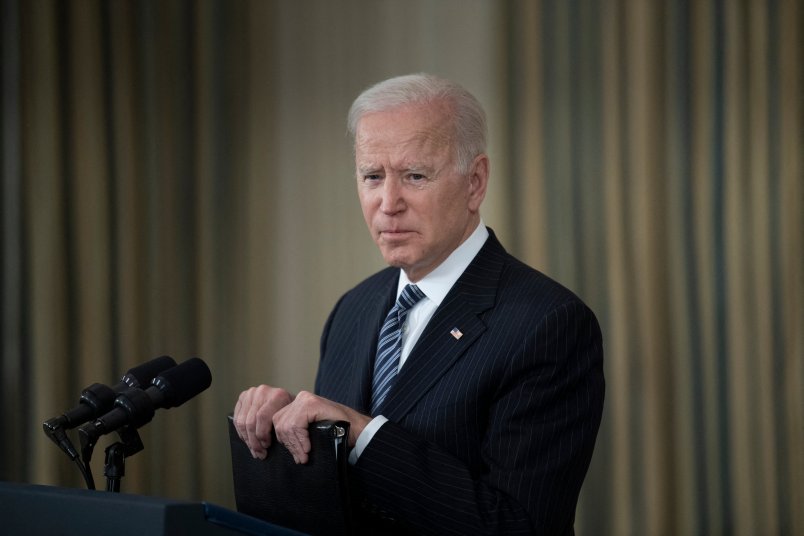The Biden administration stopped short of imposing sanctions on any Russian officials over suspected bounties offered to militants to encourage the killings of American and coalition troops in Afghanistan, acknowledging that the intelligence community does not have conclusive evidence on the matter.
“The United States intelligence community assesses, with low to moderate confidence, that Russian intelligence officers sought to encourage Taliban attacks against U.S. and coalition personnel in Afghanistan in 2019 and perhaps earlier, including through financial incentives and compensation,” a senior Biden administration official told reporters in a press call Thursday. “U.S. intelligence community agencies have low to moderate confidence in this judgment, in part because it relies on detainee reporting and due to the challenging operating environment in Afghanistan.”
The Biden White House admonished the Kremlin on Thursday over the CIA’s assessment on the bounties, but said it would only impose sanctions on Moscow over its hacking and election interference, crackdown on dissidents, cyberintrusions and its occupation of Crimea. In a White House fact sheet released Thursday entitled “Imposing Costs for Harmful Foreign Activities by the Russian Government” it used cautious language, referring to “reported Afghanistan bounties.”
The development comes months after The New York Times reported the existence of the CIA’s assessment and that the National Security Council had led a process to develop potential response options but that the Trump White House had failed to authorize any response.
In the aftermath of the Times’ report, Trump called the bounties reporting “a hoax” and denied that he had been told about the CIA’s assessment.
Asked at a press briefing Thursday whether the White House believed the CIA assessment, White House press secretary Jen Psaki said that the information available “really puts the burden on Russia and the Russian government to explain their engagement here.”
The Russian government has denied that it secretly offered or paid bounties to encourage attacks on American and coalition troops in Afghanistan.
An official familiar with internal deliberations told the Times that further scrubbing of available evidence by President Biden’s administration had not uncovered anything to ease the disagreement over confidence levels about the intelligence.
Biden, who brought up the Russian bounties in his first call as president with Russian president Vladimir Putin in January, had repeatedly criticized Trump during the 2020 presidential race for failures to stand up to Putin over the bounties intelligence.
It now appears that in making those criticisms, Biden had attributed a level of certainty to the intelligence that it had not earned, although notably, it’s uncommon for the intelligence community to achieve leak-proof levels of confidence about the covert actions of their adversaries.
In remarks at the White House on Thursday, Biden said that he told Putin in a call earlier in the week that he could have gone further with the measures and would not hesitate to take further action in the future.
“We cannot allow a foreign power to interfere in our democratic process with impunity,” Biden said.
He also cautioned against escalating tensions.
“Now is the time to de-escalate,” Biden said. “The way forward is through thoughtful dialogue and diplomatic process.”







So Biden’s not just going to make stuff up?
Russia seems to still be posturing:
https://www.reuters.com/world/europe/russias-plan-restrict-foreign-warships-near-crimea-will-keep-kerch-strait-open-2021-04-16/
ETA:
Best summary of the T**** maladministration as I’ve ever seen.
I remember they fell all over themselves trying to say whether or not Trump had even been told about the small matter.
Fat Donnie’s administration did only binary nuance - either full volume, or off.